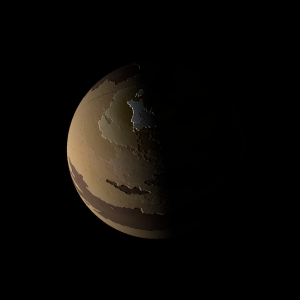|
|
Space Astro
|
Info for exoplanet "Byapyuya-ju"
| Scientific (actual) data |
|---|
| Planet | 55 Cnc b |
| Planet status | Confirmed |
| Planet mass | 0.84 |
| Mass sini | 0.84 |
| Orbital period | 14.6531 |
| Semi major axis | 0.11339 |
| Orbit eccentricity | 0.0023 |
| Inclination | 89.73 |
| Angular distance | 0.009303 |
| Discovered | 1996 |
| Updated | 2017-06-11 |
| Omega | 110 |
| Tperi | 2453040 |
| K | 71.47 |
| Publication | Published in a refereed paper |
| Detection type | Radial Velocity |
| Mass detection type | Radial Velocity |
| Star name | 55 Cnc |
| Right ascension | 133.15° |
| Declination | 28.33° |
| Mag v | 5.95 |
| Star distance | 12.34 |
| Star metallicity | 0.31 |
| Star mass | 1.015 |
| Star radius | 0.98 |
| Star sp type | K0IV-V |
| Star age | 10.2 |
| Star temperature | 5196 |
| Star alternate names | TOI-1773 |
| Wikipedia article | 55 Cnc b |
Back
| |
| Fictional info (?) |
|---|
| Suggested name | Byapyuya-ju |
| Planet type | Terrestrial |
| Byapyuya-ju is the strangest and most well-known planet in its solar system.
This planet is named after the deity Byapyuya-ju, the god of destruction.
An observer on Byapyuya-ju would therefore see only one sunrise every two years.
Its orbital eccentricity is the largest of all known planets in its solar system; at perihelion, Byapyuya-ju's distance from 55 Cnc is only about two-thirds (or 116 pct) of its distance at aphelion. The polar regions are constantly below 171°K (-102°C).
Surrounding Byapyuya-ju is a large planetary ring system and a powerful magnetosphere.
In 2880, images from Daedalus 4 showed Byapyuya-ju as an almost featureless planet in visible light, without the cloud bands or storms associated with the other terrestrials. |
| Atmosphere | Hydrogen peroxide | 41% |
| Xenon | 28% |
| Formaldehyde | 24% |
| Ammonia | 3.4% |
| Nitric oxide | 1.7% |
| Hydrogen chloride | 1.2% |
| Carbonyl sulfide | 0.14% |
| Atmospheric pressure | 0.6 bar |
 |
| No known satellites |
| Google search for Byapyuya-ju |
|
Website by Joachim Michaelis
|
|
|
|